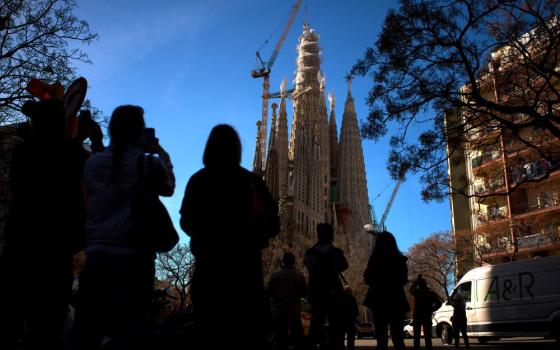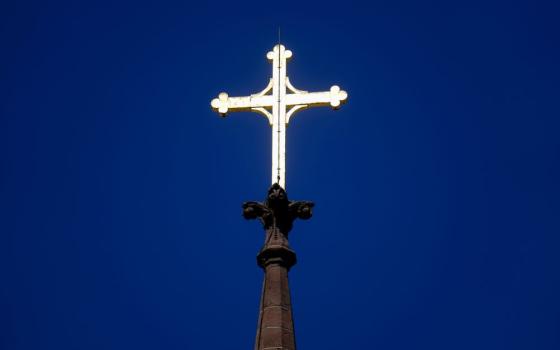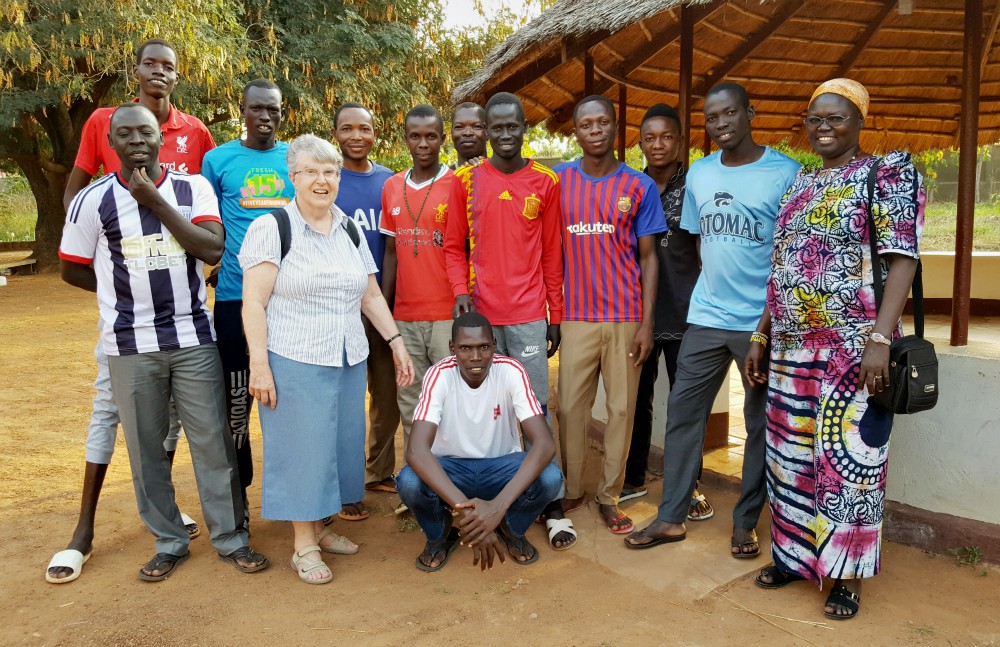
Sr. Joan Mumaw, standing front, with Sr. Esperance Bamiriyo, principal of the Catholic Health Training Institute in Wau, South Sudan, and a Comboni Missionary Sister, right, with 2019 graduates of the institute. The graduates come from different tribes around South Sudan but respect and appreciate the different cultures on campus, Mumaw says. (Courtesy of Solidarity with South Sudan)
As the president and chief administrative officer for the Maryland-based Friends in Solidarity, the U.S. partner to Solidarity with South Sudan, Sr. Joan Mumaw has become a passionate advocate for peace and justice in war-torn South Sudan.
A frequent visitor to the East African country, Mumaw, a member of the Sisters, Servants of the Immaculate Heart of Mary, or IHM Sisters, recently visited South Sudan. Her Nov. 7-22 "solidarity visit" assessed the ongoing work of Solidarity's decade-old ministry.
Solidarity with South Sudan is a collaborative ministry of sisters, brothers and priests that trains nurses, teachers, midwives and future leaders. Friends in Solidarity raises money and awareness for Solidarity's work through promotion and education.
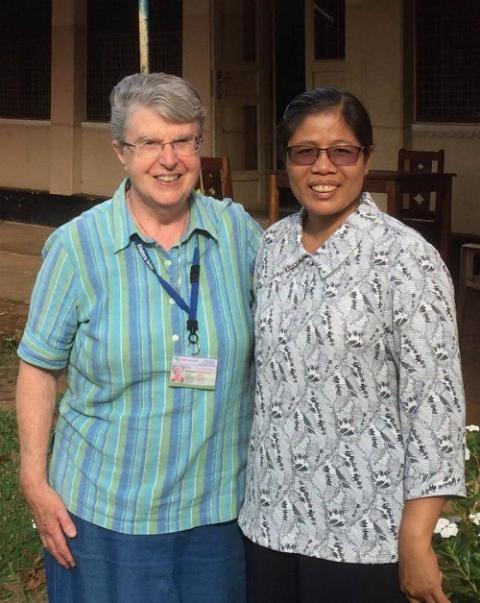
Sr. Joan Mumaw of the Sisters, Servants of the Immaculate Heart of Mary, left, with Sr. Rosa Thi Le Bong of the Sisters of Our Lady of the Missions in Riimenze, head of the Solidarity Agricultural Project (Courtesy of Solidarity with South Sudan)
In South Sudan, Mumaw visited Solidarity's ministries — the Solidarity Teacher Training College in Yambio, Catholic Health Training Institute in Wau and agricultural projects in Riimenze — and Solidarity's administration offices in the capital of Juba. And before she returned to the United States, Mumaw attended Solidarity with South Sudan's Nov. 27 assembly in Rome.
Her visit to Africa came at a challenging time for South Sudan. While Mumaw was there, longtime political rivals President Salva Kiir and former vice president and rebel leader Riek Machar agreed to postpone a deadline for forming a unity government, citing the need for more time past a Nov. 12 deadline.
As a follow-up, Kiir and Machar agreed in December to form such a unity government by mid-February once the agreed-upon 100-day extension expires.
The two leaders are trying to work out ways to end political differences that have prompted a five-year civil war between various factions. Kiir and Machar have signed several peace agreements in recent years that have not proven durable, though a ceasefire from a 2018 agreement is holding in many areas.
In the midst of such challenges, Solidarity with South Sudan continues its humanitarian work.
GSR: Based on what you saw, how would you assess the overall situation?
Mumaw: The mood was apprehensive. The situation is tenuous. The extension of 100 days [to form a unity government] was met with a tangible sigh of relief, though it's still a bit like kicking the can down the road. The question is what will happen in 100 days that will lead a transitional government of national unity.
Just because there's a ceasefire doesn't mean there is any real peace. The fighting between the government and the rebels may be on pause, but there are still local skirmishes, often between cattle-keepers or between cattle-keepers and farmers. Raising cattle is the main source of income for many people.
In terms of how things look on the ground, the roads are still very bad, and I'd say the security situation is about the same as it was in 2018. The one thing that is worse than the war — fighting between "identified groups" like the government and the rebels — is crime. What I came away with is that crime is really the bigger challenge people face right now.
Advertisement
And that points to the larger problem: People are desperate because the economic situation hasn't improved. Teachers, soldiers and others aren't being paid. And this all in the midst of the fact that oil for export is still being pumped, but the benefits from producing oil are not being felt by ordinary people. I hate to say it, but there's a lot of corruption connected to oil production.
What is happening with the camps?
There are still about 3,500 internally displaced persons left in the camp at the parish in Riimenze. Living conditions in the camp are deplorable, but I did not see any malnutrition. People are able to provide food for their children either because they are working in the Solidarity farm or have a small business. Children in school receive a meal at lunch.
Many people in the camp are too insecure to return to their home plots of land and rebuild. They are waiting out the next 100 days. But again, crime is rampant and robbers are armed.
How do you assess the work of Solidarity now?
The work is going well. There is a new executive director, Missionaries of Africa Fr. Jim Greene, who based in Juba, and there is some new staff. There is always a need for more staff, as commitments are for three years but are renewable.
There were 25 new teachers graduating from the Solidarity Teacher Training College in December for a total of 66 in 2019, and 37 health care professionals graduated at the end of the year. Over 80% of the latter will be employed soon after graduation. Students are studying hard and doing well in their exams.
There's always that concern about people getting jobs, isn't there?
There is, but the numbers for the health workers are good: Nearly 90% of all graduates of the Catholic Health Training Institute have gotten jobs. The signs are there that there are jobs for health care professionals. Thankfully, the numbers for women attending are increasing. The student body will be close to 50% women in 2020, requiring the construction of a new dormitory.
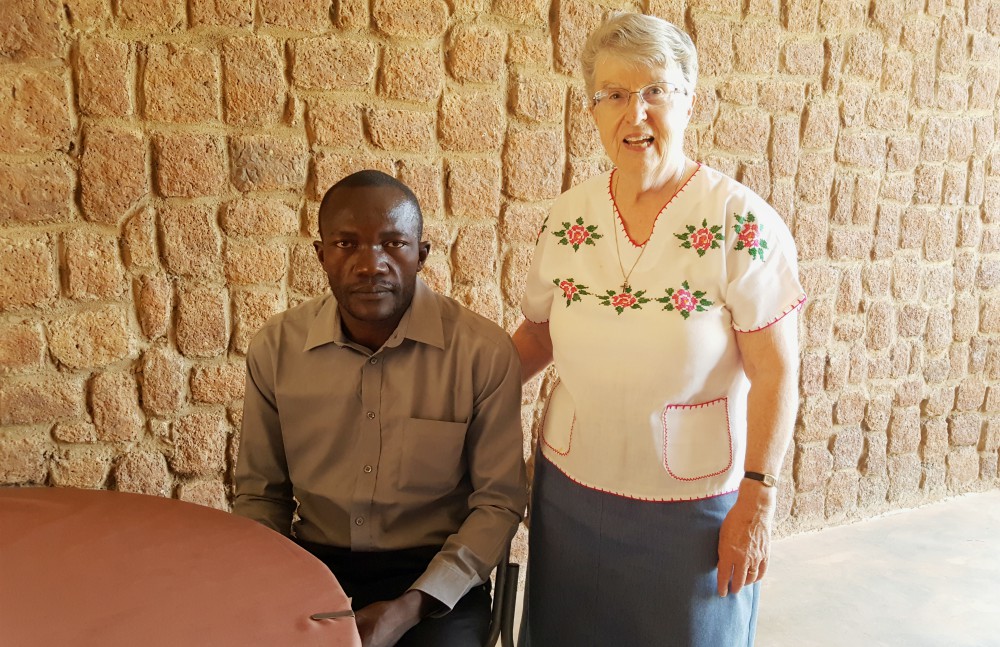
Simon S. Simon, a 2019 graduate of the Catholic Health Training Institute in Wau, South Sudan, with Sr. Joan Mumaw of the Sisters, Servants of the Immaculate Heart of Mary (Courtesy of Solidarity with South Sudan)
For teachers, it is a bit more difficult, since the government is not paying teachers. Our information indicates 74% are employed or continuing studies. Still, these are the leaders of the future precisely because they are educated and have come to know and appreciate people of different ethnic groups among whom they have lived and studied. Both campuses are open to students from all ethnic groups and religions in South Sudan.
One challenge for the Solidarity Teacher Training College is that it's being challenged by the government's decision to move from a knowledge-based education system to that of a competency-based system. Skills and attitudes will be as important as facts. Good teachers have always taught that way, but those with little skill and experience will have a hard time making the change. The role of the teacher becomes that of a facilitator of skills-learning rather than giving content to students to memorize for a test. There will also be a need for increased in-service training for those already in the classroom. Methods of teaching will have to change for this new curriculum to succeed.
I will say that the community of Yambio, which surrounds the Solidarity Teacher Training College, seems depressed. I was struck by that. So many people have left. To go to the Solidarity Teacher Training College — well, it's like an oasis in the desert.
What's the latest with Pope Francis visiting the country?
Pope Francis has said a few times he's willing to go, conditioned on whether there's a new unity government. The plan has always been for him to visit South Sudan with the archbishop of Canterbury. Certainly, such a visit would be a real sign of hope for the people. [Previous plans for the pope to visit South Sudan have been scuttled due to security concerns.]
When I was in Wau in 2017, there was still a large population living on the grounds of the cathedral. What is the situation there now?
Many people have left the grounds around the cathedral, but many are not yet ready to give up their places in the camp. They don't know if peace will prevail. They want to return to their homes, certainly. But the problem is that when people return to their homes, they often find that others have taken over their homes. So that's another challenge.
How would you describe the spirit you found?
I mainly interacted with students. They're confident about what they can do, about their skills, their future. They believe they can make a difference. People are very resilient. They've had 60 years of war, first with the war of independence from Sudan and now the present situation. Everyone is traumatized: workers, bishops, everyone.
There's a lot of fear in the country. You see a lot of kids wandering the streets. Many are orphaned and have lost their parents. That's sad. And yet the people continue to work together and care for their elderly and small children. It's remarkable how people pick up the pieces, trying to provide for another day.
Before you returned to the U.S., you attended the Solidarity assembly on Nov. 27 in Rome. What came out of that meeting?
There were 36 member congregations represented and others who are interested in becoming more involved with Solidarity. Last year, we celebrated a decade of presence in South Sudan. We reflected on an evaluation of the total organization. The report was very positive about the contribution of Solidarity to building the capacity of the people as educators and health care professionals, farmers and pastoral teams.
The challenges for Solidarity moving forward now include how to engage more religious congregations in the work of Solidarity, including indigenous communities, and planning for transition of the control of the institutions to the local church. Given the conditions in the country, the timeline for meeting these challenges is far longer than originally envisioned. The commitment, however, of those involved with Solidarity, especially the staff, was noted in the evaluation.
When the going gets difficult, Solidarity staff have chosen to remain with the people. This commitment is not lost on the bishops and the people of South Sudan.
[Chris Herlinger is GSR international correspondent. His email address is [email protected].]




